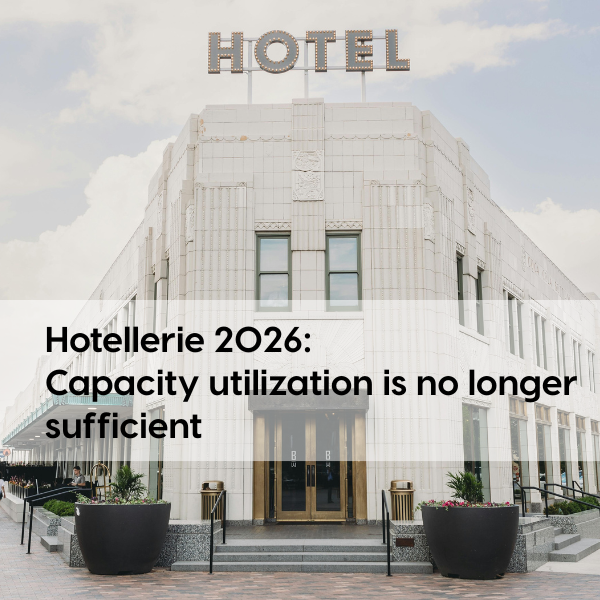Tourismus & Hotellerie
Investor Talk with Gregor Hoch
Structures create space

An interview with profitize investor Gregor Hoch about exceptional emotional situations, financial overview and why it sometimes only takes one step to become able to act again.
Gregor Hoch was a host in Lech, President of the Austrian Hotelier Association and an employee at the Hotel and Tourism Bank. Today, he supports hotels that need to reposition themselves economically — whether in times of crisis or for strategic development. In an interview, he explains why accepting help is not a sign of weakness, how operational experience is linked to financial overview and why the famous gut feeling is not enough when things get tight.
Gregor, how would you describe yourself today?
I am a business consultant with a focus on tourism businesses. I assist hotels with financing and controlling issues, restructuring, insolvency proceedings or when they want to set up new processes. It is often simply a matter of using an outside perspective to help them get back on stable legs or to prevent them from stumbling.
How did this role come about?
I come from Lech and grew up with tourism. After working for Marriott, in Hong Kong, in various hotels and at the Austrian Hotel and Tourism Bank, I returned to Lech to run our family hotel. It was clear to me early on how complex a hotel business really is. This is not a linear company — it is a system of emotion, hospitality, technology, business administration. Everything interacts with each other.
Over time, I've noticed that I can also use my knowledge in other ways. During Corona, uncertainty in the industry was enormous. I remember talking to a seasoned hotelier, over 40 years in business. I asked him how he was doing. And he bursts into tears.
That's when I realized that we need people who provide professional help and understand what the hotel industry feels like from within.
How do you approach situations like this?
I have operational experience. I know the challenges in the company as well as the business side. I know what it's like to be responsible — economically, but also humanly.
I'm not coming as a know-it-all. I come as someone who has experienced running a hotel myself. And it can help to add structure. Because that is often exactly what is missing: structure, overview, clarity.
Why do many find it difficult to accept help?
I don't think that's an industry-specific issue. It is more of a personal matter. Some people are open, others prefer to close. Especially when you think you're the only one who isn't doing well, you don't talk about it.
But that is exactly what is dangerous. Because if you wait too long, you lose time. And time is often the deciding factor in such situations.
What is your position on the issue of mistakes?
Mistakes happen. And sometimes a single wrong decision — at the wrong time, with the wrong information — is enough and you start to skid economically. But that doesn't make you a bad entrepreneur. The decisive factor is how you deal with it.
Mistakes are part of this. The question is whether you learn anything from it — whether you do it better next time. And that is precisely an important part of the process.
In your experience, what do companies lack the most?
An overall picture. Most have data from PMS, POS, bank, payroll, but nothing is connected. The merge is missing. And therefore the opportunity to make well-founded decisions.
I don't want to give advice based on feeling. I want to be able to say: This is your break-even. If you don't have funding approval in six weeks, the money is gone. That sounds harsh, but it creates security. And people need them.
How can digital tools help, such as systems such as profitze?
They create an overview. When you ask some hoteliers how things are going, you often hear: “I think it fits pretty well anyway.” But when you look together, it turns out that it's more gut feeling than certainty.
It's about knowing what you really have left over at the end of the month. And this is exactly where such systems come in, they help you understand your own figures. And in such a way that you not only look in the rearview mirror, but also recognize: Is it enough? Or is it getting tight?
Many feel the discomfort in the stomach. They're hoping it'll work out somehow, but they're not sure. When the data is transparent, uncertainty becomes orientation. And that is the first step towards getting back into action.
What do you give young hoteliers along the way?
Stay curious. Get out of your own bubble. Back then, during my studies, I took a subject every semester that had nothing to do with my studies in international business administration. Astronomy, dramaturgy, technical math, anything. The main thing is that it broadens the horizon.
You'll never meet so many smart people in one place again and learn to see a problem from multiple perspectives. It also helps later.
And your advice for anyone who is currently in a difficult situation?
Don't stay alone. That is the biggest mistake. There are ways and there are people who know them.
A hotel is a complex system. But when you dare to look, sort things out, take the next step, that's when you get moving again. And room for manoeuvre.
About the person — Gregor Hoch
Gregor Hoch was a host in Lech am Arlberg and has placed the management of his businesses in the hands of his wife Waltraud Hoch, is honorary president of the Austrian Hotelier Association and worked at the Austrian Hotel and Tourism Bank. Today, he supports tourist companies in economically challenging situations with extensive operational experience, business expertise and a keen sense of what a company goes through emotionally. He is also an investor in profitize.
Oder kontaktieren Sie uns.
Simply contact us via email. We look forward to hearing and reading from you.
hello@profitize.io

.png)

.png)
.png)
.png)
.png)
.png)
.png)
.png)

.png)
.png)
.png)
.png)
.png)
.png)
.png)
.png)
.png)
.png)
.png)
.png)
.png)
.png)
.png)

.png)
.png)
.png)
.png)


.png)
.png)
%20(600%20x%20400%20px).png)
%20(800%20x%20600%20px).png)

.png)



.png)



